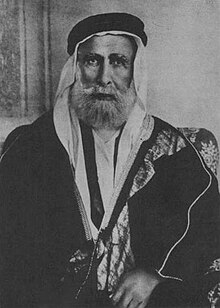
Back الحسين بن علي شريف مكة Arabic الحسين بن على شريف مكه ARZ Hüseyn ibn Əli əl-Haşimi Azerbaijani شریف حسین AZB Хусейн бен Алі Byelorussian হুসাইন বিন আলি, মক্কার শরিফ Bengali/Bangla Hussein ibn Ali (xerif de la Meca) Catalan حوسێن بن عەلی CKB Husajn ibn Alí al-Hášimí Czech Hussein bin Ali, Sharif Mecca Welsh

Hussein bin Ali Al-Hashimi, was the Sharif of Mecca and the one who, following the Hussein McMahon correspondace, incited the Arab revolt against the Ottoman Empire in World War l. By calling themselves Hashemites, his family claims to descend from the Prophet Banu Hashim. This lineage, along with the fact that Sharif Hussein has been the official protector of the holy sites of Mecca and Medina since 1908, legitimized him for many Arab Muslims as the natural leader of the Arabs.
Having been under Ottoman rule for a long time and serving as officials of the Ottoman government, Sharif Hussein and his sons did not participate in the Arab nationalist movement and political opposition that had emerged in Damascus, Beirut and Cairo around 1912 before the First World War. However, their position changed when the Ottoman Sultan Abdülhamit II and the CUP government began to centralize their power, narrowing down on Hussein with the Hijaz railway from Damascus to Medina, thereby threatening the autonomous power of Sharif Hussein in 1908. When war broke out, Hussein saw an opportunity to expand his influence and oppose Ottoman rule. Sharif Hussein became the leader of the Arab revolt and in the subsequent Hussein-McMahon correspondence, it was he who negotiated with the British for an independent Arab state in exchange for the Arab revolt against the Ottomans.[1]
- ↑ Anderson, Betty S. (2016). A history of the modern Middle East : Rulers, Rebels, and Rogues. Stanford: Stanford University Press. pp. 189–191. ISBN 978-0-8047-8324-8. OCLC 934278220.